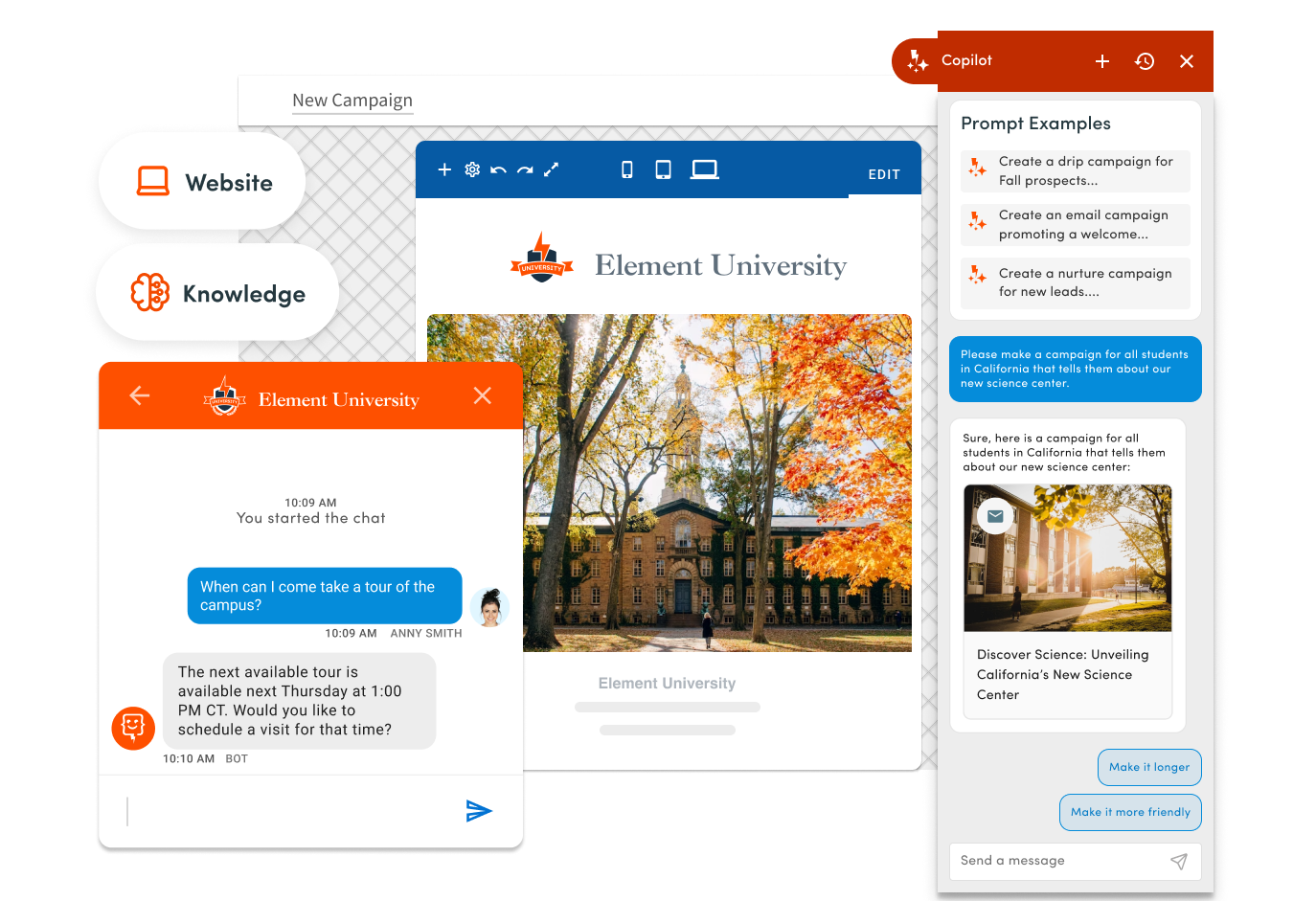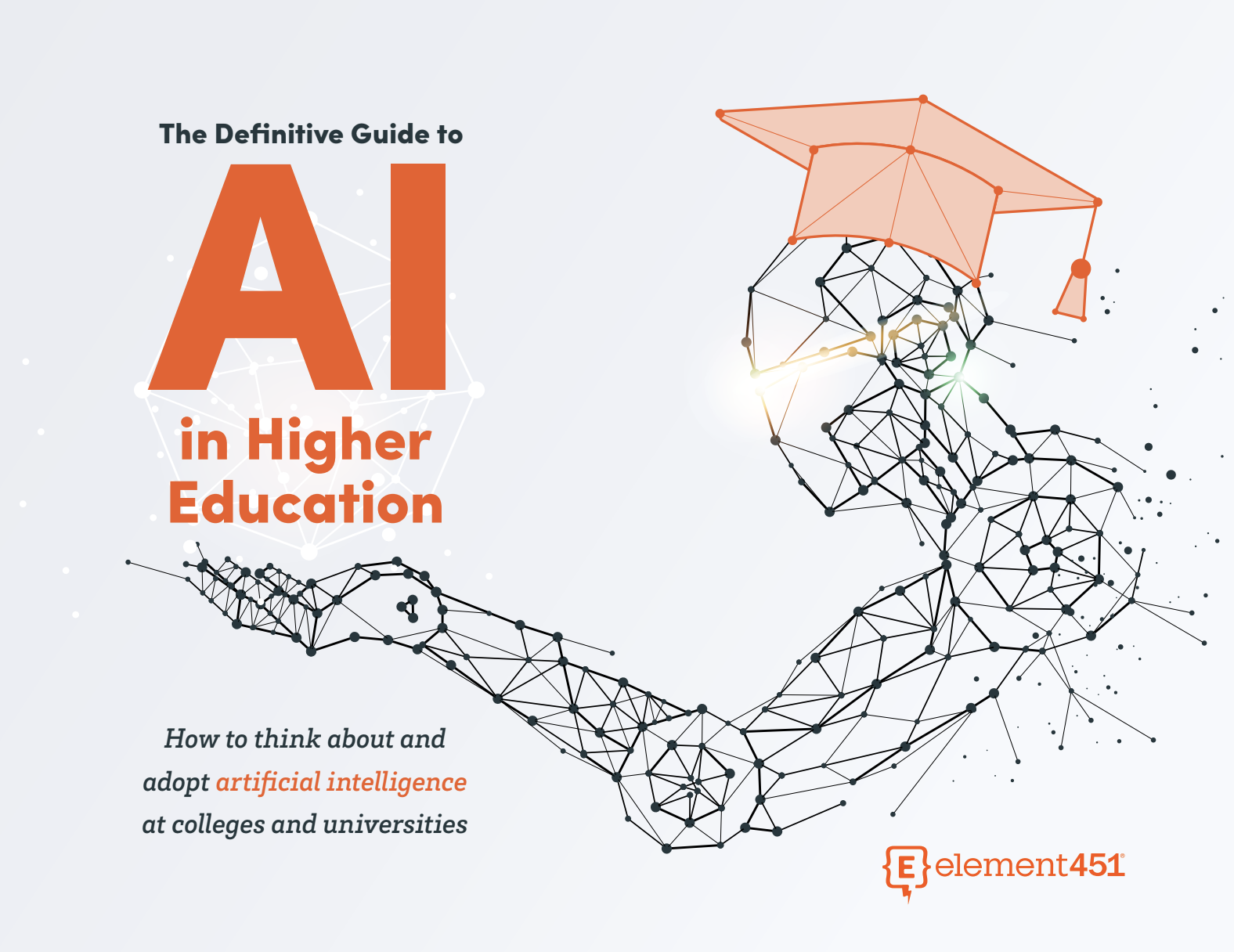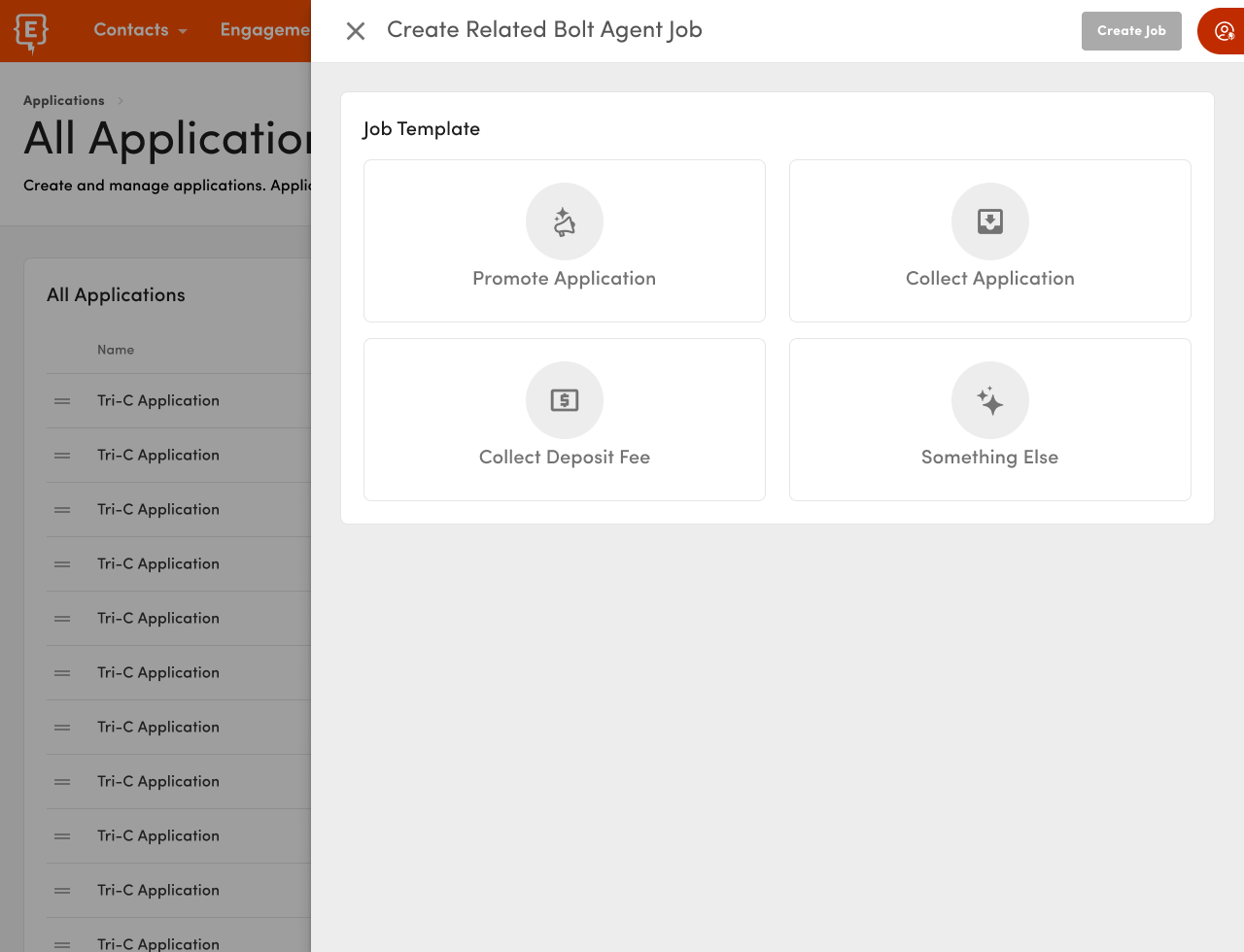Student Retention Initiatives for Modern Colleges and Universities
by Rita Winthrop · Updated Sep 13, 2024
Many of today’s higher education institutions constantly strive to increase enrollment and encourage higher student retention. Not only do these strategies help schools stay competitive, but retention tactics illuminate the value of completing a degree.
Unfortunately, student attrition and turnover rates remain high, and higher education leaders have many reasons to blame. Financial troubles, poor academic performance, and lack of engagement are all factors that hinder a student's ability to succeed in college.
To combat these retention issues, many institutions have turned to data-driven strategies to move students forward in their degree plans. With ideas like proactive advising programs, better campus social experiences, and expansive support services, students have additional opportunities to succeed.
In this post, we’ll share several ideas for retention initiatives that your school can use to improve student relationships and ensure higher degree completion rates.
What is Student Retention in the College Setting?
In the college setting, student retention refers to the ability of an institution to keep enrolled students progressing on a path of degree attainment. Retention, then, isn’t about getting students in the door as much as it is about ensuring that they stay engaged, motivated, and prepared for graduation.
Because we’ve covered this topic in-depth before, let’s reiterate the big picture idea behind student retention:
“The basic definition of student retention is to keep students actively enrolled and participating in their degree program at a college, university, community college, or any other institution of higher learning.”
Student retention strategies are navigational, guiding students to their ultimate destination when they achieve a degree. Higher education retention rates are metrics that showcase a school’s dedication to quality educational programming, robust student support, and a productive campus community.
What Do Students Miss Without Retention Goals?
When students fail to stay engaged or active in their degree plans, there’s a lot at stake. Wasted time, financial aid dollars, and lost academic credits are some of the greatest risks, and many of these have far-reaching impacts.
But without retention initiatives to help them, many students have to face their own untapped potential, and dreams of graduation slowly start to fade. When students lose interest in completing their chosen degrees, institutions also lose out on the contributions of current attendees (and the possibilities of attracting and enrolling new students).
Let’s not forget—student retention isn't only about numbers. In fact, it directly corresponds to greater graduation rates, transformed lives, and a brighter future through the avenues that higher education provides.
Reasons for High Rates of Student Attrition
Soaring student attrition rates raise a crucial question — why do so many aspiring learners set lofty academic goals, only to veer off course before achieving the end result?
From financial burdens and lack of academic preparedness, many of today’s college students face shifting personal priorities without enough support. To help countless students avoid falling through the cracks, college leaders and administrators must understand why these troubles happen in the first place.
Financial Difficulties
Financial challenges are a major barrier to success for students of all walks of life — from career-savvy community college attendees to beginner liberal arts freshmen.
Offering financial assistance through scholarships, grants, and work-study programs can offset the rising cost of attending college or living on campus. When students don't have to worry about the financial burden of paying for their attendance, they can better focus on their studies and stay motivated to keep going.
Poor Academic Performance
Below-average academic performance is a known barrier to success, and it prevents many college students from maintaining recurrent enrollment. As the cornerstone of degree completion, academic achievement directly impacts the trajectory of a student's future.
When college students struggle with coursework, they also lose confidence, motivation, and the drive to persevere. Unfortunately, poor grades also jeopardize financial aid and scholarship eligibility, intensifying the financial pressure that many students already feel.
There’s a personal side as well. Academic failures can amplify feelings of frustration and isolation, which directly undermines retention efforts. Addressing academic challenges through effective support systems ensures that students remain engaged and poised to thrive in the collegiate environment.
Lack of Engagement or Belonging
A sense of belonging is critical for college students as they strive to obtain degrees (and throughout the student journey). When students lack connection, their academic journey falters.
>> Catch Up: What’s the Student Lifecycle and Why Does it Matter? <<
Without a sense of safety and reassurance, many students feel that their personal and academic challenges are too overwhelming, which results in early departure. But when students enjoy more connections, they’re more likely to seek help when they need it most. Colleges that want to retain more students must prioritize inclusive environments that are ripe for cultivating healthy relationships.
Unclear Expectations or Objectives
Unclear expectations are a roadblock to student achievement—plain and simple.
When students lack clear guidelines for academic progress and graduation requirements, they become confused and uncertain of the path forward. College staff must work diligently to clear up confusing coursework, prerequisites, and program specifics so that students don’t waste time jumping through hoops or taking classes they don’t need.
Addressing these challenges is a pivotal step to improving retention rates, because the path to graduation becomes easier to follow. Plus, students won’t feel as though they’re wasting valuable financial aid dollars on misguided directions.
Poor Time Management Skills
Lacking good time management skills can negatively impact college students' ability to stay committed to their degree programs. Likewise, poor organization leads to missed assignments and classes, unfinished coursework, and higher student stress levels.
Any disruption in academic progress can cause students to fall behind in ways that negatively change their motivation and engagement. To retain students, staff members like academic advisors must help students develop better study skills and achieve important benchmarks.
Improving time management is crucial as students learn to independently balance classwork, extracurricular responsibilities, and personal factors. The likelihood of successfully completing a college degree program is much higher when students make continual progress, one step at a time, with the right academic skills in place.

Get A Demo of Element451
With its powerful and customizable platform, Element451 can provide an unparalleled level of support to institutions seeking to engage with their students in a more effective and dynamic way.
See How It Works
Fostering a Sense of College Community and Camaraderie
One of the greatest ways that schools can help students feel truly at home is to generate a sense of community, friendship, or togetherness. This is especially valuable for community colleges or commuter schools, where the majority of students come and go for academic sessions but don’t reside on campus.
In many contexts, creating a sense of community powerfully engages students and encourages them to feel more present during their degree program. Activities like student-led organizations, social and extracurricular clubs, and campus events can be motivators that offer students more reasons to engage with peers and classmates — which could make them more likely to stay in college.
To put community into practice, encourage students to participate in extracurricular activities or events that appeal to their interests.
The Best Retention Strategies for Higher Ed Institutions
Today, many higher education institutions are committed to employing strategies that enhance student success and engagement.
From proactive academic advising and personalized learning approaches to classroom flexibility with hybrid options, these tactics cater to the ever-changing needs of modern students. Higher education can (and should) rise to the occasion when it comes to future expectations, and better retention initiatives can help achieve that.
>> Don’t Miss: Element451’s Complete Guide to Retention in Higher Education <<
Proactive Advising Programs
Student advising programs offer practical support to college and university students by keeping a pulse on their academic progress.
These programs go beyond traditional advising by identifying and addressing issues as red flags (in other words—early on), to help students stay on track. Advisors use data for personalized guidance and mentorship. These activities might include:
- Assisting students in choosing the right courses
- Managing the academic workload or other responsibilities
- Overcoming unique academic, personal, or social challenges
A proactive approach also reduces confusion and improves retention through more active partnership. This method of advising is also useful when students need help developing time management skills or learning to navigate a new season of early adulthood. In short, more retention-focused, student-first advising ensures that students not only reach their academic goals but also learn to adapt and thrive.
Flexible Scheduling Options
Some college students are tasked with balancing school among other personal responsibilities, namely work and family. When colleges offer hybrid or flexible scheduling options (including online courses, night classes, weekend sessions, or intensives) students get the benefit of extra time and bandwidth.
At the end of the day, a flexible approach has the potential to reduce heightening stress levels and ease the mental burden that many students experience for the first time in college.
Enhancing the University Experience
Elevating the campus social experience is one tactic to improve student retention that hinges on what many students crave — connection. When students benefit from healthy time with their peers, they’re often more likely to stay excited about the academic journey.
Colleges and universities might choose to offer or sponsor diverse student clubs, social events, community initiatives, or local public gatherings that encourage interactions beyond the classroom. Remind students that they don’t exist in a bubble and that there’s a world beyond the dorm room that offers them plenty of opportunities to grow, serve, and learn.
Student leaders and college personnel are wise to remember that investing in the campus social environment is also an important step in achieving long-term success and retention.
Culture of Support and Accountability
Higher education leaders and admissions officers must also hold students accountable for their academic performance. Regularly remind students of the standards that earned them a spot in a particular program, and highlight the merits of strong academic achievement. Faculty support and modern resources are also essential in making this strategy a reality.
To balance the intensity of many academic endeavors, always celebrate students' successes. Schools can do this by recognizing achievers regularly, providing positive reinforcement in and outside of the classroom, and communicating often to help students stay in the loop.
Comprehensive Academic Support Services
In today’s higher education environment, retention must go beyond the basics. That’s why more schools are opting for creative and flexible approaches to student advising and support. Not only do these ideas cater to students in need, but they also have the potential to attract a new generation of students who view college with a different set of experiences and expectations.
- Peer Mentoring Programs: Establish a peer mentorship network where experienced students guide and support younger learners or first-year students.
- Virtual Tutoring Centers: Provide online access to tutoring services and resources, giving students more timely assistance regardless of where they’re located.
- Holistic Wellness Programs: Offer mental healthcare resources and counseling services to support students' emotional well-being alongside the academic journey.
- Data-Driven Advising: Use data analytics to identify struggling students early, and give personalized support for academic roadblocks.
- Work-Integrated Learning: Partner with local businesses and enterprise organizations to create internships and hands-on experiences that bridge the gap between classroom learning through real-world application.
Increasing Retention Rates at Your College or University
As you can see, student retention isn’t solely about numbers, metrics, or analytics. It’s also about the quality of the experience that you deliver to students. Encouraging progress from the very first interaction starts with understanding what they need — and how your institution can bridge that gap.
With the right support, you can help more students achieve their educational goals and change the trajectory of their lives.
>> Meet your students where they are, and request a call with Element451 today. <<

About Element451
Boost enrollment, improve engagement, and support students with an AI-driven CRM and agent platform built for higher ed. Element451 makes personalization scalable and success repeatable.
Categories
New Blog Posts

The Definitive Guide
AI in Higher Education
Bridge the gap between the latest tech advancements and your institution's success.
Useful Links
Related Articles

Talk With Us
Element451 is an AI-driven CRM and AI agent platform for higher education. Our friendly experts are here to help you explore how Element451 can improve outcomes for your school and students.
Get a Demo








